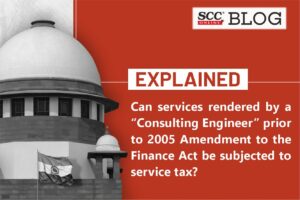Supreme Court: The bench of MR Shah* and Sanjiv Khanna, JJ has reversed the ruling of Customs, Excise & Service Tax Appellate Tribunal, Delhi (CESTAT) wherein it was held that the services rendered by a “Consulting Engineer” were not subjected to service tax.
Background
In the case at hand, a Chinese Government Company Sepco Electric Power Construction Corporation entered into a contract with Bharat Aluminium Co. Ltd. (BALCO) for providing “Design Engineering Services” and “Project Management & Technical Services”. In terms of the said agreement, it rendered “Consulting Engineer Services” to BALCO.
Pursuant to the CESTAT order, the question that fell for consideration before the Supreme Court was regarding the scope of definition of “consulting engineer” under Section 65(31) of the Finance Act, 1994, specifically as to whether a “body corporate” is covered within its sweep prior to the amendment in 2005.
It is important to note that post 2005, the definition of “consulting engineer” under Section 65(31) has been amended and now it specifically includes a “body corporate”. Therefore, as such, with respect to the proceedings post amendment 2005, there will be no difficulty. After the amendment, any “body corporate”, a service provider providing the services as “consulting engineer” is liable to pay the service tax.
Analysis
Under the Finance Act, 1994, the definition of “consulting engineer” in Section 65(31) covers services provided to a client by a professionally qualified engineer or an engineering firm consisting of professionally qualified engineers. The taxable attribute is that the services must be rendered in a professional capacity.
Prior to amendment 2005, by a Circular/Trade Notice dated 4.7.1997, the definition of “consulting engineer” under the Finance Act, 1994 was specifically explained and as per the said Trade Notice, “consulting engineer” means any professionally qualified engineer or engineering firm who, either directly or indirectly, venders any advice, consultancy or technical assistance in any manner to a client in one or more disciplines of engineering. It also further clarified that “consulting engineer” shall include self-employed professionally qualified engineer who may or may not have employed others to assist him or it could an engineering firm – whether organised as a sole proprietorship – partnership, a private or a Public Ltd. company.
Also, in many places under the Finance Act, 1994, the Parliament/Legislature has used the word “person” (Sections 68, 69 and 70). At this stage, Section 3(42) of the General Clauses Act, 1897 is also required to be referred to, considered and applied. The word “person” includes any company or association or body of individuals, whether incorporated or not.
Hence, it could be seen that it was never the intention of the legislation to exclude a “body corporate” from the definition of “consulting engineer” and from the “service tax net”.
Further, if it is held otherwise, in that case, it would remove all companies providing technical services, advice or consultancy to their clients from the service tax net, while any such services rendered by an individual or a partnership firm would continue to remain taxable. That does not seem to be an intention on the part of the legislature to exclude the “body corporate” from the definition of “consulting engineer”. There does not seem to be any logic to exclude “body corporate” from the definition of “consulting engineer”.
“If the submission on behalf of the respondent is accepted and the “body corporate” is excluded from the service tax, in that case, it would not only lead to absurdity but also would create two different classes providing the same services. That cannot be the intention of the legislature to create two separate classes providing the same services and to exclude one class.”
Ruling on facts
Applying the aforementioned law to the case at hand, the Court held that the respondent, being a service provider providing consultancy engineering services, was/is liable to pay the service tax for such services being “consulting engineer” within the definition of Section 65(31) of the Finance Act, 1994 and therefore and thereby liable to pay the service tax under Section 66 r/w Section 68 of the Finance Act, 1994.
[Commissioner of Central Excise v. Sepco Electric Power Construction Corporation, 2022 SCC OnLine SC 833, decided on 11.07.2022]
*Judgment by: Justice MR Shah
Counsels
For Revenue: Additional Solicitor General of India Balbir Singh
For Respondent: Advocate P.K. Sahu

